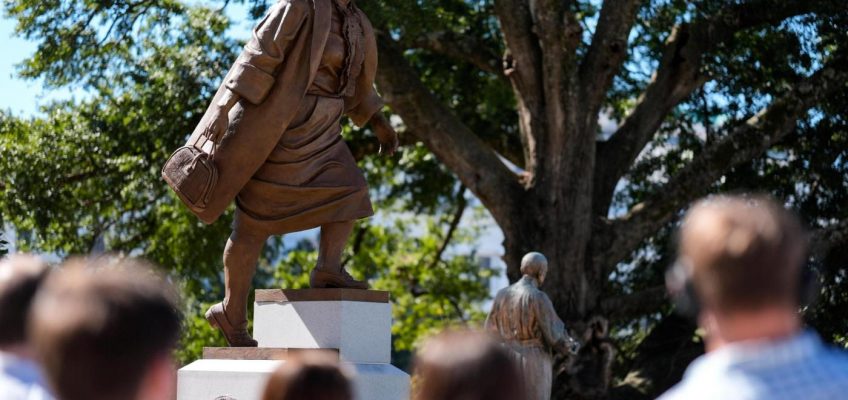By SUSAN MONTOYA BRYAN
ALBUQUERQUE, N.M. (AP) — It’s a name many people have trouble pronouncing, but these synthetic chemicals have been used in everything from fast-food packaging to nonstick cookware, clothing, household cleaning products and even firefighting foam.
Related Articles
In a California farming region, researchers are mapping rural heat to protect farmworkers
Lacking community resilience centers, Houston neighbors opt for solar-powered ‘hub homes’
‘Chemtrail’ theories warn of health dangers from contrails. The idea takes wing at Kennedy’s HHS
As heat gets more extreme, pregnant farmworkers are increasingly at risk
What Americans think about the environmental impact of AI, according to a new poll
PFAS — or perfluoroalkyl and polyfluoroalkyl substances — resist breaking down and as a result have found their way into drinking water, soil, air and the bloodstreams of 99% of Americans.
This is certainly true for people who live or work near a plume of contamination that has seeped beyond the boundaries of Cannon Air Force Base, where PFAS-laden firefighting foam was used for years.
New Mexico health and environmental officials conducted a $1.2 million testing project, drawing blood from nearly 630 people. They shared the results Thursday night during a public meeting.
What did they find?
The research shows 99.7% of participants had one or more PFAS in their blood, with the most common being associated with firefighting foams.
While the percentage isn’t surprising given the overall prevalence of so-called forever chemicals in the environment, officials said some residents living in the plume area showed dramatically higher concentrations than the broader testing group. About one-quarter of them had levels reaching the highest concentration tier used in national guidelines.
The findings suggest a correlation with groundwater contamination migrating from the base, state officials said.
New Mexico Environment Secretary James Kenney said during the meeting that his agency will help the community in any way that it can but that the state is still locked in litigation with the U.S. Defense Department over the damage caused by the contamination.
At Cannon Air Force Base, state officials have reported that PFAS has been detected in groundwater at concentrations of 26,200 parts per trillion, exceeding state and federal drinking water standards by over 650,000%.
Cannon reported earlier this year that it has spent more than $73 million so far on investigating the problem and installing pilot projects to treat contaminated groundwater.
Kenney said it’s time for the federal government to move ahead with cleanup outside the base.
“We need the whole of New Mexico to stand up and say we’ve had it,” he said.
Health concerns
Exposure to PFAS has been linked to increased cholesterol levels, small decreases in birth weight, kidney and testicular cancer and changes in liver enzymes.
State officials in a report published in August said some of the chemicals can linger in the blood for several years after exposure. Research by the U.S. Environmental Protection Agency has also found it can take weeks to years for levels of many PFAS to decrease by half in human blood, assuming exposure isn’t ongoing.
It’s not easy to draw a bright line between exposure and health effects, said Tasha Stoiber, a senior scientist with the Washington, D.C.-based Environmental Working Group.
“There are so many different factors that affect individual health outcomes and also affect what levels you will see in your blood,” she said, explaining that a person’s age, where they live, what they eat and drink and where they work can all play a role.
According to slides shared with the audience, the tests in Curry County showed PFAS levels tend to increase with age, that males had higher levels, and those who had military or aviation careers had higher concentrations — all things consistent with national data.
The state on Friday announced a $12 million effort to connect about 100 private well users in rural Curry County to a drinking water system that meets state and federal standards.
An expanding problem
Watchdog groups that track PFAS nationwide say contamination is more widespread than previously thought. They’re using data released by the EPA and states to compile maps showing spots across the country where drinking water systems report levels above what’s recommended. Contamination has also been confirmed at hundreds of military bases around the country.
That includes a base in southern New Mexico, where state officials are embarking on another health survey to gauge exposure at a nearby lake where scientists documented some of the highest PFAS levels in wildlife and plants worldwide.
In Clovis, Thursday’s audience was sparse but outspoken. They voiced frustrations that properties have been devalued and rural livelihoods threatened due to the contamination.
New Mexico is among hundreds of plaintiffs that are part of multi-district litigation in a South Carolina federal court that aims to hold producers and users of PFAS-laden firefighting foam accountable for contamination at sites across the country.
Separate from the legal front, some states have adopted their own PFAS rules while the focus of federal regulations has been narrowed. New Mexico just this week held a webinar on a new state law that calls for phasing out and ultimately prohibiting the sale of products containing intentionally added PFAS.




